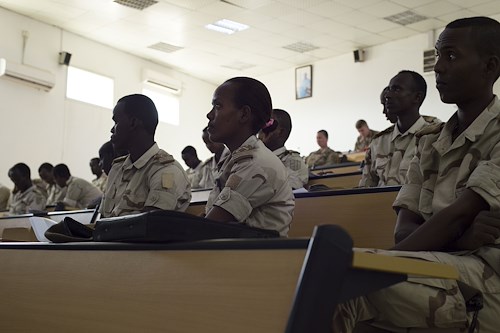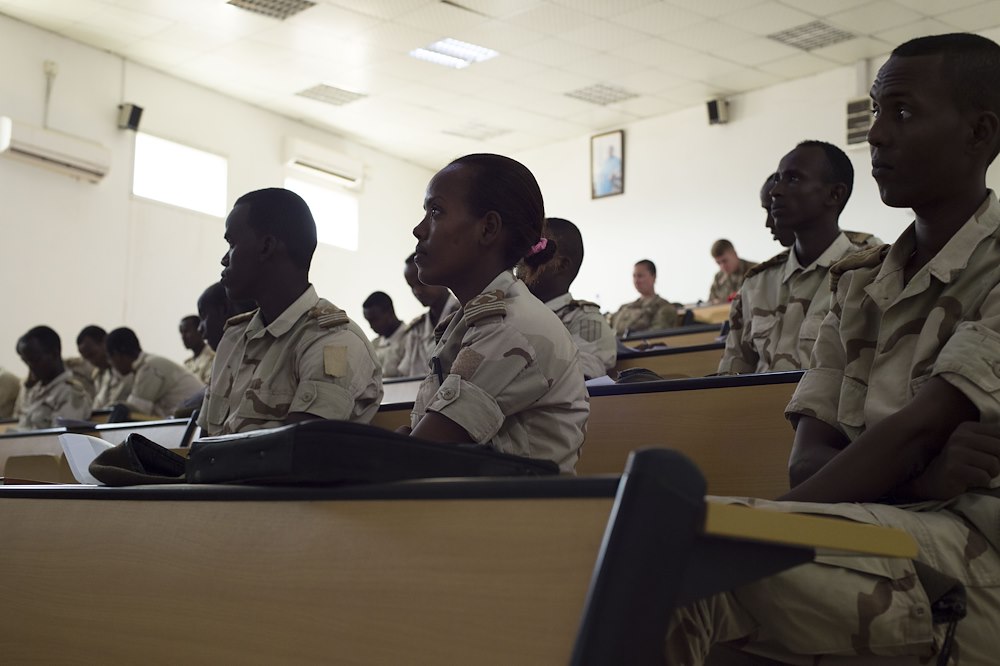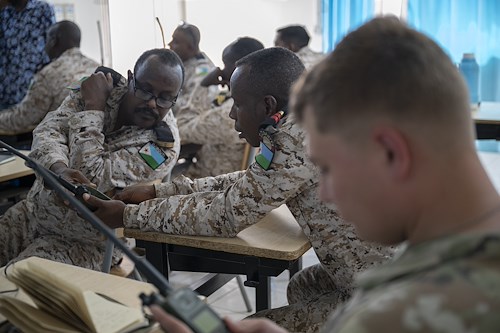Gallery contains 12 images
×
Photo 1 of 12
Combined Joint Task Force - Horn of Africa Image
Djibouti’s Arta Interservices Military Academy cadets listen as members from the U.S. Army 403rd Civil Affairs Battalion teach about the importance of developing relations with host nation locals during Civil Military Cooperation training May 17, 2016, at Arta, Djibouti. The two-week training taught the cadets communication skills to use when they deploy to Somalia. (U.S. Air Force photo by Staff Sgt. Eric Summers Jr.)
Photo by: U.S. Air Force Staff Sgt. Eric Summers Jr.
Photo 2 of 12
Combined Joint Task Force - Horn of Africa Image
U.S. Army Capt. Scott Wyly, 403rd Civil Affairs Battalion team leader, teaches Djibouti’s Arta Interservices Military Academy cadets how to interact with host nation civilians in areas of conflict May 17, 2016, at Arta, Djibouti. The third-year cadets are scheduled to graduate in September and have the possibility of deploying to Somalia after a year. (U.S. Air Force photo by Staff Sgt. Eric Summers Jr.)
Photo by: U.S. Air Force Staff Sgt. Eric Summers Jr.
Photo 3 of 12
Combined Joint Task Force - Horn of Africa Image
Sgt. 1st Class Cynthia Price, 403rd Civil Affairs instructor, provides feedback to Djibouti’s Arta Interservices Military Academy cadets during Civil Military Cooperation training May 18, 2016, at Arta, Djibouti. The feedback educated the cadets on their strengths and weaknesses during training scenarios to better prepare them for the next task. (U.S. Air Force photo by Staff Sgt. Eric Summers Jr.)
Photo by: U.S. Air Force Staff Sgt. Eric Summers Jr.
Photo 4 of 12
Combined Joint Task Force - Horn of Africa Image
Cadet Ali, Djibouti’s Arta Interservices Military Academy third-year student, attempts to negotiate with U.S. Army Spc. Kristie Richardson, 403rd Civil Affairs and scenario role player, during Civil Military Cooperation training May 18, 2016, at Arta, Djibouti. The course was intended to teach the cadets communication and interaction skills with host nation civilians, and for them to pass the information to other soldiers after they graduate and are assigned to units. (U.S. Air Force photo by Staff Sgt. Eric Summers Jr.)
Photo by: U.S. Air Force Staff Sgt. Eric Summers Jr.
Photo 5 of 12
Combined Joint Task Force - Horn of Africa Image
Djibouti’s Arta Interservices Military Academy cadets assess the needs and well-being of a U.S. service member role-playing as an injured aid worker in Somalia during Civil Military Cooperation training May 18, 2016, at Arta, Djibouti. The training concluded with a two-day exercise for the cadets to implement the skills they learned during the training. (U.S. Air Force photo by Staff Sgt. Eric Summers Jr.)
Photo by: U.S. Air Force Staff Sgt. Eric Summers Jr.
Photo 6 of 12
Combined Joint Task Force - Horn of Africa Image
Djibouti’s Arta Interservices Military Academy cadets engage in conversation with U.S. Army 403rd Civil Affairs members acting as Somali key leaders during a training scenario May 18, 2016, at Arta, Djibouti. The Civil Affairs team taught the cadets a variety of skills to include how to conduct meetings, key leader engagements and proper use of interpreters. (U.S. Air Force photo by Staff Sgt. Eric Summers Jr.)
Photo by: U.S. Air Force Staff Sgt. Eric Summers Jr.
Photo 7 of 12
Combined Joint Task Force - Horn of Africa Image
Photo 8 of 12
Combined Joint Task Force - Horn of Africa Image
Photo 9 of 12
Combined Joint Task Force - Horn of Africa Image
Photo 10 of 12
Combined Joint Task Force - Horn of Africa Image
Photo 11 of 12
Combined Joint Task Force - Horn of Africa Image
Photo 12 of 12
Combined Joint Task Force - Horn of Africa Image
During conflicts there are always casualties, which are usually accompanied by destruction. While this is an expectation for those involved, there are usually noncombatants who inhabit the area and may suffer as well.
The Combined Joint Task Force-Horn of Africa 403rd Civil Affairs team recently taught a group of Djibouti’s Arta Interservices Military Academy (AMIA)cadets the importance of keeping those inhabitants in mind when facing conflict during a Civil Military Cooperation course May 5-19, 2016, at Arta, Djibouti.
The two-week course taught the third-year students a variety of civil engagement skills ranging from conducting meetings and key leader engagement to support of civil actors and proper ways to work with interpreters to better prepare them as future leaders.
“The training is important because we will have to engage the enemy in whatever area, and that area maybe populated by civilians,” said Cadet Abdourahim, AMIA second-year student. “This class was important [because it taught us to be] conscious that there are always civilians that are suffering during a confrontation between governments, and army and insurgents. So the CIMIC training was all about being conscious of the civilians and considering them.”
The cadets, who are scheduled to graduate in September and become lieutenants in the Djiboutian Army, will likely deploy to Somalia and these skills can be critical in the fight against Al-Shabab, according to Capt. Scott Wyly, 403rd Civil Affairs team leader.
“The purpose of the training is to prepare them when they go down to Somalia where they are fighting an insurgency against Al-Shabab,” Wyly said. “One of the best ways to fight an insurgency is to win over the population. Build those relationships working with the locals and helping them solve problems is one of the best ways to defeat an insurgency.”
The training concluded with role-play scenarios where the students had to interact with Americans acting as Somali villagers to demonstrate the skills they learned.
“We learned about how to engage with leaders, we also learned how to do a survey so we have to look at the area and people that live in it and consider what kind of people they are, what are their needs, what problems we may cause them so as to rectify, and do what we can to not impact their lives,” Adbourahim said.
He also said that it’s important for Djibouti to work with the U.S. because as an allied country they can benefit from their knowledge and know how, and apply it to their Army and standards.
“The U.S. Forces have a lot of experience in many countries like Iraq and Afghanistan, so they know a lot about the warfare theatre,” Abdourahim continued. ”They were just sharing their knowledge that if you do not look at the civilians, if you do not consider them our mission will be much more difficult. “
While the Djiboutian cadets learned a lot from the Civil Affairs team, they were also able to share knowledge with them as well.
“This has been beneficial, not just for the Djiboutians, but my team as well,” Wyly said. “We have really learned a lot from these guys. This is the first time that we have ever worked the entire course with translators, and just learning about their country, their culture and their military has been a really rewarding experience for us all. “
Abdourahim agreed that both nations benefited a lot from the training and looks forward to putting the training to use.
“The goal that we have for these cadets is that what we train them, we want them to train their soldiers when they get to their units.” Wyly said. “We are very confident that these cadets will be able to take what they learned and pass it on their soldiers.”









































